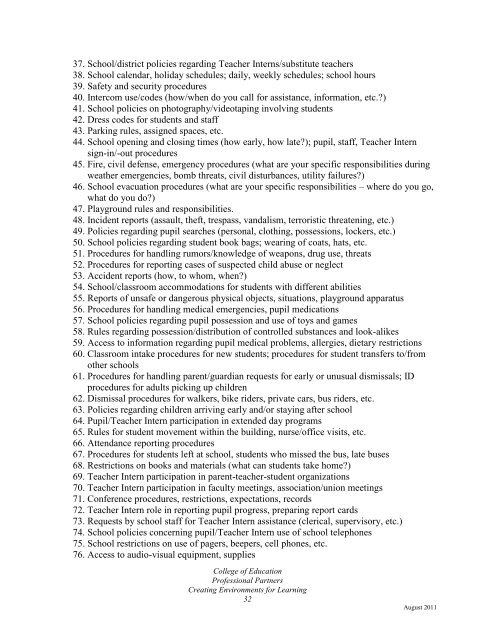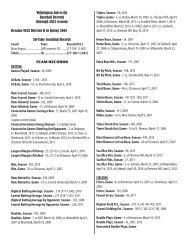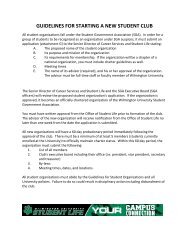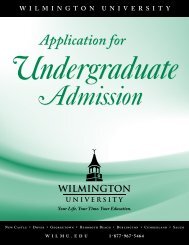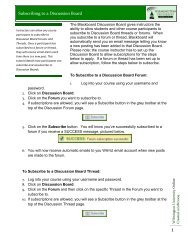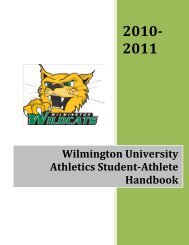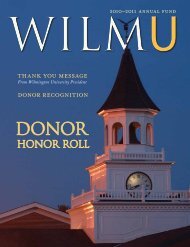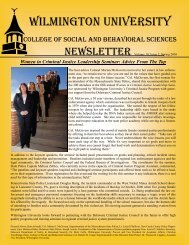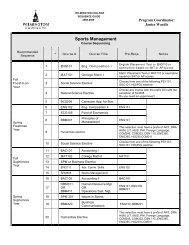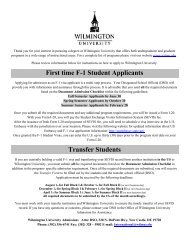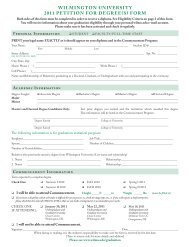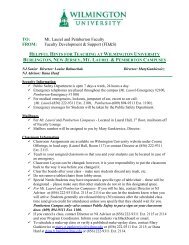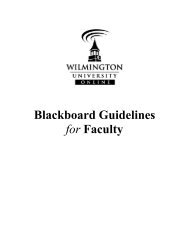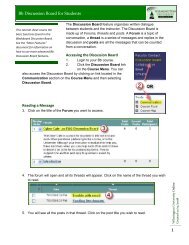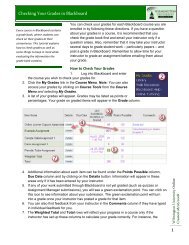handbook for cooperating teachers - Wilmington University
handbook for cooperating teachers - Wilmington University
handbook for cooperating teachers - Wilmington University
You also want an ePaper? Increase the reach of your titles
YUMPU automatically turns print PDFs into web optimized ePapers that Google loves.
37. School/district policies regarding Teacher Interns/substitute <strong>teachers</strong>38. School calendar, holiday schedules; daily, weekly schedules; school hours39. Safety and security procedures40. Intercom use/codes (how/when do you call <strong>for</strong> assistance, in<strong>for</strong>mation, etc.?)41. School policies on photography/videotaping involving students42. Dress codes <strong>for</strong> students and staff43. Parking rules, assigned spaces, etc.44. School opening and closing times (how early, how late?); pupil, staff, Teacher Internsign-in/-out procedures45. Fire, civil defense, emergency procedures (what are your specific responsibilities duringweather emergencies, bomb threats, civil disturbances, utility failures?)46. School evacuation procedures (what are your specific responsibilities – where do you go,what do you do?)47. Playground rules and responsibilities.48. Incident reports (assault, theft, trespass, vandalism, terroristic threatening, etc.)49. Policies regarding pupil searches (personal, clothing, possessions, lockers, etc.)50. School policies regarding student book bags; wearing of coats, hats, etc.51. Procedures <strong>for</strong> handling rumors/knowledge of weapons, drug use, threats52. Procedures <strong>for</strong> reporting cases of suspected child abuse or neglect53. Accident reports (how, to whom, when?)54. School/classroom accommodations <strong>for</strong> students with different abilities55. Reports of unsafe or dangerous physical objects, situations, playground apparatus56. Procedures <strong>for</strong> handling medical emergencies, pupil medications57. School policies regarding pupil possession and use of toys and games58. Rules regarding possession/distribution of controlled substances and look-alikes59. Access to in<strong>for</strong>mation regarding pupil medical problems, allergies, dietary restrictions60. Classroom intake procedures <strong>for</strong> new students; procedures <strong>for</strong> student transfers to/fromother schools61. Procedures <strong>for</strong> handling parent/guardian requests <strong>for</strong> early or unusual dismissals; IDprocedures <strong>for</strong> adults picking up children62. Dismissal procedures <strong>for</strong> walkers, bike riders, private cars, bus riders, etc.63. Policies regarding children arriving early and/or staying after school64. Pupil/Teacher Intern participation in extended day programs65. Rules <strong>for</strong> student movement within the building, nurse/office visits, etc.66. Attendance reporting procedures67. Procedures <strong>for</strong> students left at school, students who missed the bus, late buses68. Restrictions on books and materials (what can students take home?)69. Teacher Intern participation in parent-teacher-student organizations70. Teacher Intern participation in faculty meetings, association/union meetings71. Conference procedures, restrictions, expectations, records72. Teacher Intern role in reporting pupil progress, preparing report cards73. Requests by school staff <strong>for</strong> Teacher Intern assistance (clerical, supervisory, etc.)74. School policies concerning pupil/Teacher Intern use of school telephones75. School restrictions on use of pagers, beepers, cell phones, etc.76. Access to audio-visual equipment, suppliesCollege of EducationProfessional PartnersCreating Environments <strong>for</strong> Learning32August 2011


